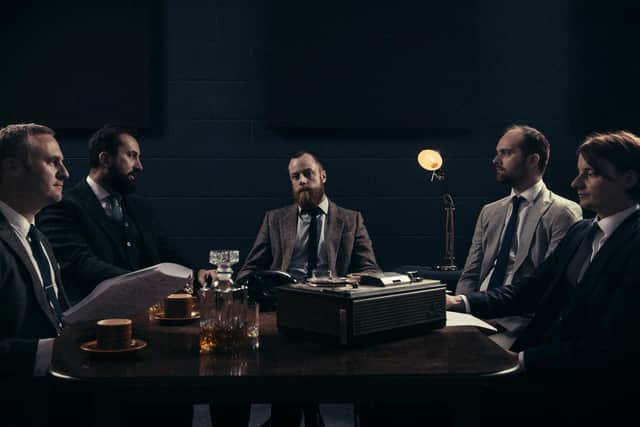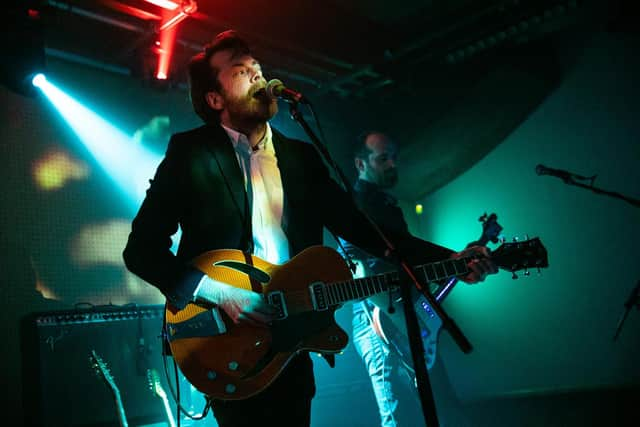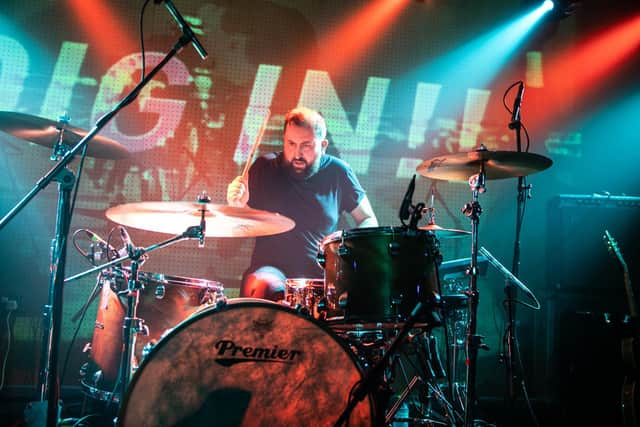I Like Trains interview: The Leeds band on Kompromat, getting back to the stage and why the city is thriving
and live on Freeview channel 276
Performing a headline show at Brudenell Social Club in December, in front of some familiar faces and new fans picked up during lockdown, lead vocalist David Martin said getting back to the stage was like "riding a bike" and any built up nerves quickly faded away.
The five-piece band released Kompromat, short for 'compromising material' in Russian, during the height of the first lockdown.
Advertisement
Hide AdAdvertisement
Hide AdIt's a timely record grappling with feelings of social injustice and isolation, despite being written before the pandemic.


“We hadn’t released a record in eight years and that’s a lifetime in music," David told the Yorkshire Evening Post.
"Bands have had reasonably successful careers and disappeared during that time.
“You don’t know what’s waiting for you when you’ve left it that long, but to have the appreciation we had so deep into our career was great.
Advertisement
Hide AdAdvertisement
Hide Ad"And we felt like we were breaking new ground with the music we were making, not rehashing what we used to sound like.


“That can be a lot for old fans to take in, but it feels like they took it to their hearts and we picked up some new fans along the way.”
I Like Trains formed in Leeds in 2004; David and guitarist Guy Bannister knew each other from school and moved to Leeds to study, meeting drummer Simon Fogal at university and bassist Alistair Bowis through friends.
They later recruited guitarist Ian Jarrold and the band carved out a distinctively dark, politically-charged sound with David's lyrics penned on tragic historical events and figures.


Advertisement
Hide AdAdvertisement
Hide AdIt was a heyday for Leeds bands at a time when the Kaiser Chiefs were "putting a spotlight" on the city, David said.
"Leeds has always fostered a really close scene that helps each other out," he added.
"We didn’t feel the need to go anywhere else to do what we wanted to do. It felt natural to be here."
Simon said: “When we started out the Cockpit was becoming a big thing and Brudenell Social Club was just starting to put gigs on. There was a sense of community.”
Advertisement
Hide AdAdvertisement
Hide AdAs well as nurturing a loyal Leeds fanbase, I Like Trains have performed in front of large crowds across Europe.
Both David and Simon's career highlight was headlining Off Festival in Poland in 2008, followed closely by MTV Poland, on a stage carved out in the clearing of woods.
“It’s all been downhill since,” David laughed.
“But saying that, the last shows we did were in December at the Brudenell and the Village Underground in London.
Advertisement
Hide AdAdvertisement
Hide Ad"We hadn’t performed for a while, for obvious reasons, so we’d been waiting to perform tracks from our latest album - which came out 18 months previously.
“There was a sense of anticipation that had built up through that time, we were enjoying the album and it was great to be able to play that in front of everyone.
"There’s an angry element to the record, about the way modern politics is handled, and it was a very cathartic experience.”
Simon added: "People have put genre tags on the album, from post-punk to LCD Soundsystem-esque and everything in between. I guess that means there’s something for everyone.”
Advertisement
Hide AdAdvertisement
Hide AdThe band will embark on a rescheduled European tour this year and David teased of new music to come, "filling in the gaps" of what has happened since Kompromat's release.
He said the record feels "more relevant than it's ever been" and the band's pessimistic worldview has struck a chord with listeners old and new.
David added: “People were wrestling with all of this stuff in lockdown and had a lot of time to reflect on the state of the world and politics.
"At the beginning of our career, in 2004-2006, bands weren’t really making those overtly political statements - it was almost a dirty word.
Advertisement
Hide AdAdvertisement
Hide Ad"Now, it feels like you can’t avoid that. On a daily basis you can see how unfair the entire world is. There will be several flashpoints throughout the day when you think, ‘how did we get here?’
“We’ve never set out to tell people what they should think, it’s just a reflection of that rage and frustration.”
Supporting bands post-pandemic
I Like Trains may have taken less of a hit from lockdowns than less-established bands, each of the members have day jobs, but Simon and David stressed the importance of supporting artists.
“I get a lot of people asking the best way to support us," Simon said.
Advertisement
Hide AdAdvertisement
Hide Ad"Band Camp is a great way to buy from us personally and on the third Friday of every month, they do no fees for the artist."
David added: "I’m not anti-streaming, because people will consume music in the way that’s convenient to them, but they need to recognise that can’t be the entirety of a band’s income.
"For bands coming through, I’d like there to be a thriving music scene and for culture to reflect the views of the populace and tackle social issues for years to come.
"It shouldn’t be just a privileged few that can do that."
'Leeds is an exciting place to be'
Simon firmly believes Leeds' music and culture scene is emerging stronger from the pandemic.
Advertisement
Hide AdAdvertisement
Hide AdAs the head of Leeds-based lifestyle agency Chapter 81 and the co-founder of the pioneering outdoor venue Chow Down, he has worked with Leeds City Council, Leeds Business Improvement District, restaurants, music venues and more to keep the city thriving.
Almost 70,000 people visited Chow Down over the winter alone and Simon praised the togetherness of the city as it springs back to life
He said: “I think Nathan from the Brudenell was pretty heroic in pulling together the industry in lockdown, he was cheerleading nationally to bring back noise.
"The Cultural Recovery Fund has helped a lot of venues, the Wardrobe has been refitted and got a better sound system due to that money and the Brudenell has been upgraded.
Advertisement
Hide AdAdvertisement
Hide Ad"There's the new Live at Leeds in the Park and Garden Party has announced they’ve got a much bigger site this year.
“A lot of music venues are in a better state than they’ve ever been and there are more shows now than there ever was. Coming out, I think people have learnt from previous mistakes before Covid and have been rallying on.
"People are going big because we’ve been locked away. Leeds is an exciting place to be at the moment and the city is going to thrive now."
Support the YEP and become a subscriber today. Enjoy unlimited access to local news and the latest on Leeds United. With a digital subscription, you'll see fewer ads, enjoy faster load times, and get access to exclusive newsletters and content. Click here to subscribe.
